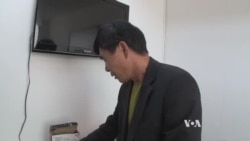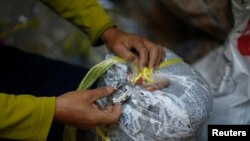South Korea-based activists recently launched balloons loaded with propaganda leaflets over the country's heavily militarized northern land border, triggering a volley of gunfire between border security guards and forcing a bilateral relations dialog to the point of collapse.
The airborne leafleting effort is nothing new. Lee Min-bok, a North Korean defector, and his group, the Campaign For Helping North Korea in Direct Way (sic), have used balloons to send printed messages, CDs and even little radios tuned for uncensored news and information, into the country since at least 2003.
“The balloon launch is a primitive humanitarian activity for human rights, which opens eyes, ears and mouths of North Korean people that have been closed by the North Korean regime,” said Lee, an evangelical Christian and former North Korean agricultural scientist.
He speaks from experience. Each year his group launches hundreds of the leaflet-packed, lightweight vessels into North Korea, where access to the Internet and international news media outlets is strictly controlled. While most of balloons go undetected, the gunfire resulting from this weekend's launch has increased diplomatic tensions less than a week after both countries had agreed to talks after a senior North Korean delegation made a surprise visit to South Korea for the Asian Games.
The planned negotiations raised hopes of at least temporarily improved relations between the neighbors, which are still technically at war following their 1950s conflict.
North Korean state television even broadcast threats of retaliatory military strikes and possible cancellation of recently scheduled high-level talks aimed at easing military tensions.
"If [South Korea] truly hopes for resolution in relationship and high-level dialogue as well, they should respect us and have courtesy first," a recent KRT newscaster declared.
Military officials on both sides reportedly met to discuss Friday's incident, in which Pyongyang's military opened fire on the balloons. When some of the rounds fell on the southern side of the border, Seoul returned fire. No injuries or damage were reported on either side.
Lim Byeong-cheol, South Korea’s Unification Ministry spokesman, says while Seoul officials cannot ban the balloon launches, they will urge activists to practice restraint.
"The government has been calling on the groups to make careful and wise decisions on sending anti-North Korea leaflets due to concern for people's safety," he said.
While Lee says he understands the risks and concerns, he doesn't plan to stop.
“I don’t do this for political reason and this activity is justified in the spirit of the constitution," he said. "But the activity must be done more quietly.”
Lee downplays the likelihood of the balloon launches sparking a military conflict, but says he and other activists will continue to do it as wind conditions permit.
VOA News Producer in Seoul Youmi Kim contributed to this report.







